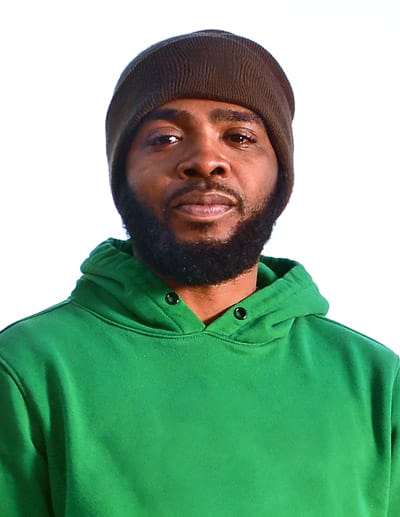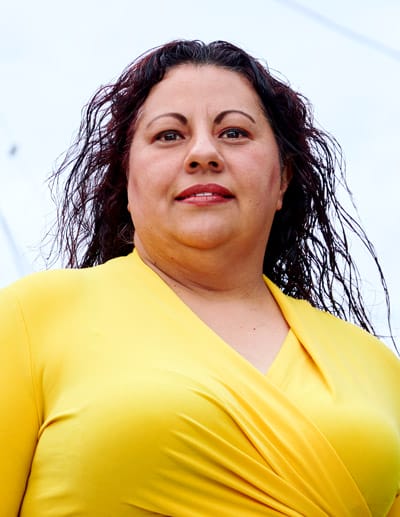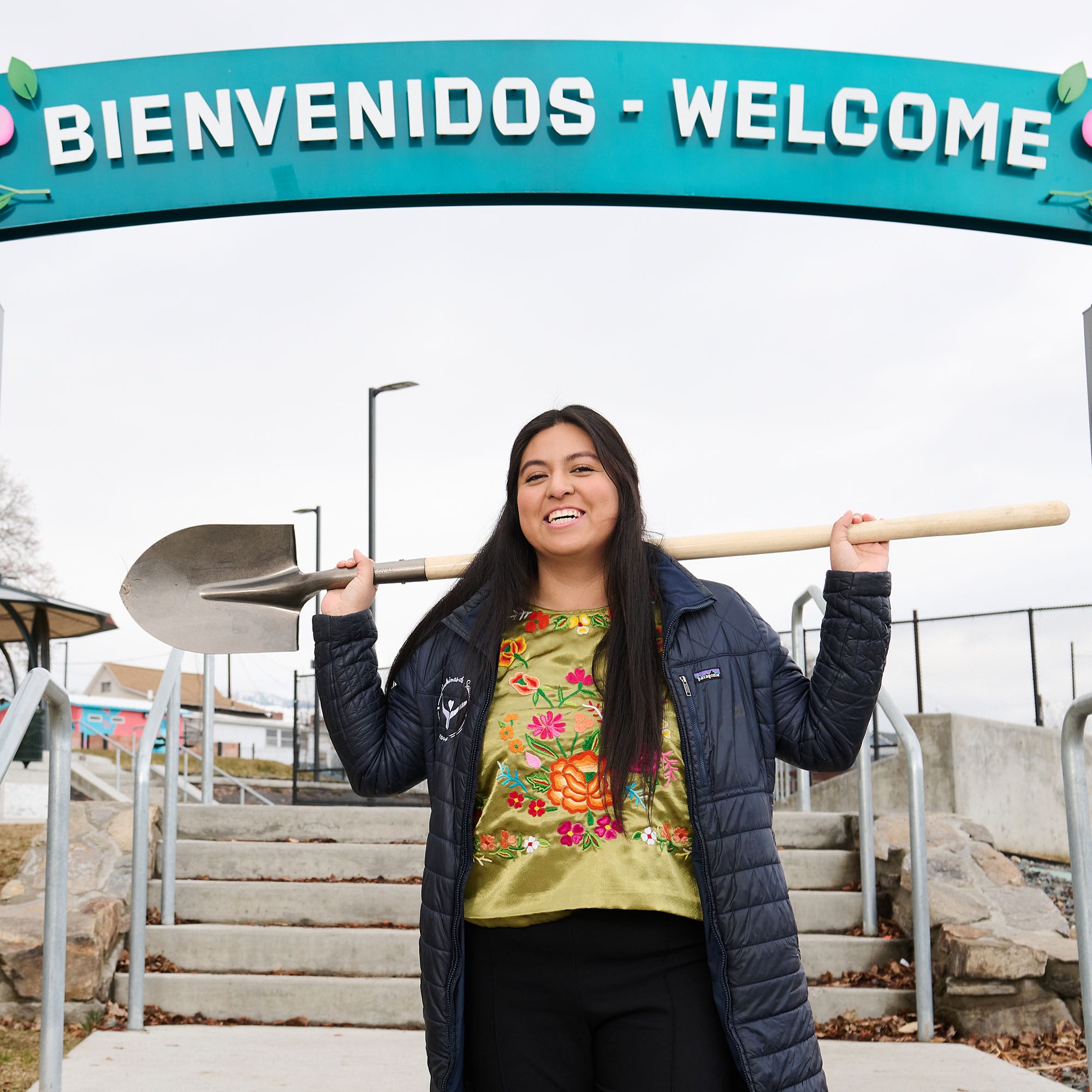
Teresa and the Parque Padrinos raised their voices to transform their local park and the town of Wenatchee, Washington.
By Amy Kunz
Published April 1, 2023
Words have meaning. Names have meaning. Land has meaning.
To visit Wenatchee, Washington’s Kiwanis Methow Park and meet Community Impact Hero Teresa Bendito is to understand the power of all three.
Teresa, whose surname means “blessed” in English, seems imbued with and driven by a sense of obligation to pay forward her own good fortune. “I think about when my parents first came here from Mexico and all the people who helped them,” she says. “I think of my own experience growing up and the people who took a chance on me, who supported me along the way. I want to . . . make that difference in someone else’s life. I’ve encountered people who have . . . opened doors for me, and I just want to make sure that I can continue to hold them open for others.”
She has, indeed, and she started by first opening her ears to her neighbors at a community meeting. She was there to translate for her mother—an English-language learner—who understood what was being said at those meetings but often struggled to express her own thoughts in English.
Trust for Public Land’s Cary Simmons, a project manager at the time, held the meeting to seek input from residents about a park renovation project. Kiwanis Methow Park was one of the only public green spaces in South Wenatchee, but for decades, it had attracted the wrong kind of attention from city leaders. To discourage gang activity, the city cut down trees and installed a chain-link fence and towering industrial floodlights. For years, kids growing up nearby, including Teresa, were warned away from spending time there.
A prior history of displacement and unfulfilled promises by local authorities left Teresa’s mom and others in Wenatchee reticent but hopeful this time would be different. And it was.
What Teresa heard from Simmons and what he heard from them—by actively listening—helped the community rebuild trust.
One-third of Americans, including 28 million children, lack safe, easy access to a park within a 10-minute walk of home. Urge your senators to allocate funding to create parks and enhance outdoor recreational opportunities by championing the Outdoors for All Act today!
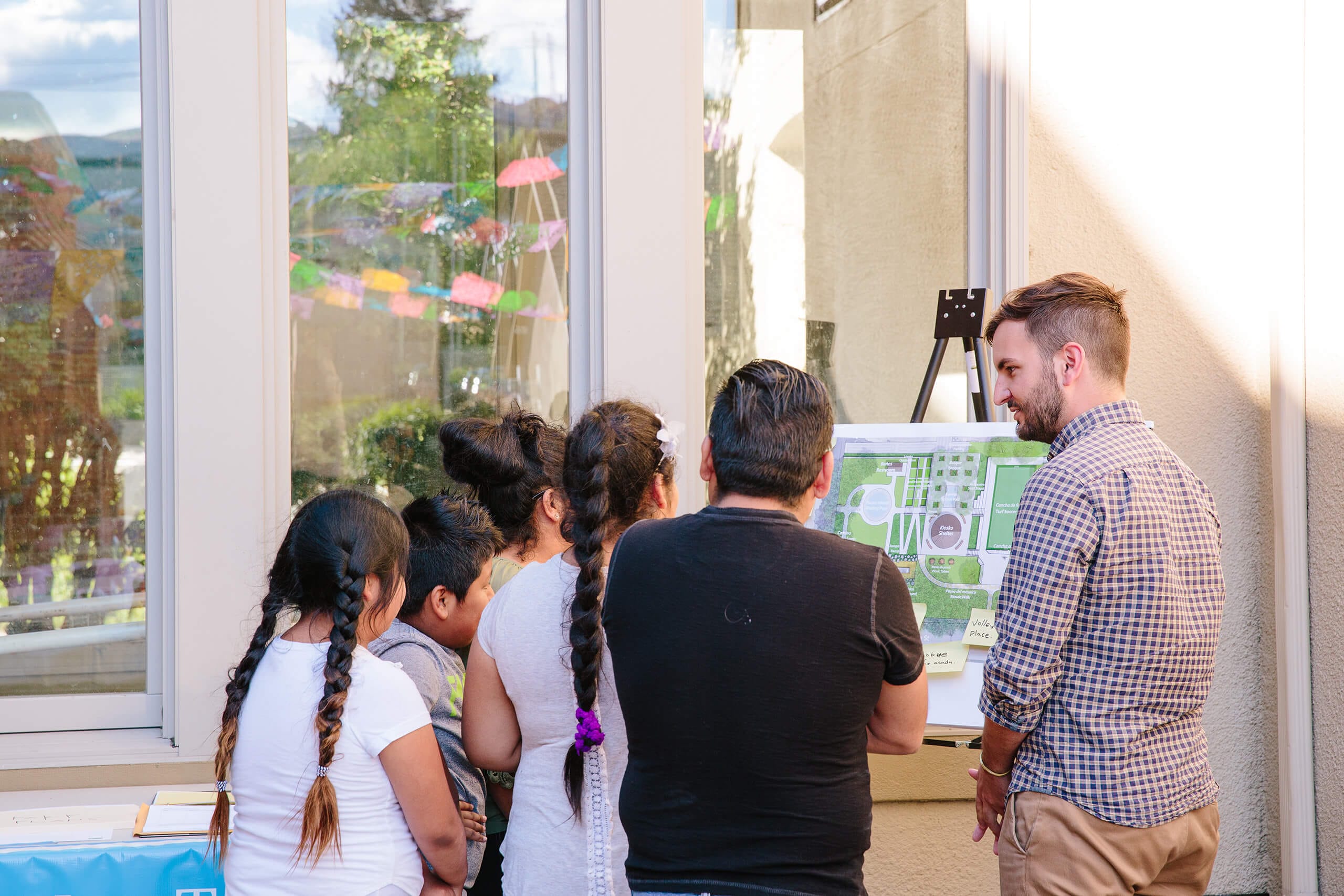
At the meeting, Teresa saw the far-reaching impact TPL’s participatory, community-led design process could have if more neighbors got involved so the park would reflect the needs of the growing immigrant population.
“In my community, we often talked about recreation, and how the Wenatchee Valley is a well-known hub for it; however, most of the options for outdoor activities are out of reach, are too expensive, or require specific skills that a lot of people do not have,” says Teresa. “For example, my parents never even thought about skiing and didn’t know how to swim. I believe that parks and green spaces are an important first step for so many people.
“Parks are people’s backyards in a lot of cases. They are the first experience people have of the outdoors. That’s why they need to be something that meets their needs, but also are accessible and open to them.”
A teenager at the time, Teresa and her mother got involved as paid community organizers with TPL after attending that first meeting. They went door-to-door to listen, carefully, as Simmons had, to their neighbors about what they wanted and needed in a park. Teresa encouraged them to attend community meetings where she again acted as a translator so they could communicate their vision, their desire, in their own language.
Teresa knew the park would serve as something the community could rally around and, in the process, discover their collective power to change their surroundings for the better. “I try to incorporate as many people in community processes, and sometimes, yes, it takes more energy, time, and resources, but, to me, it is worth it,” she says.
Conversations about the park revealed other issues troubling the community. Residents discussed job insecurity, the lack of affordable housing, public safety, and mental health—top of mind following a spate of suicides in the area. The park—and the process of designing it—offered a place for people to be heard and to find positive, healthy activities.
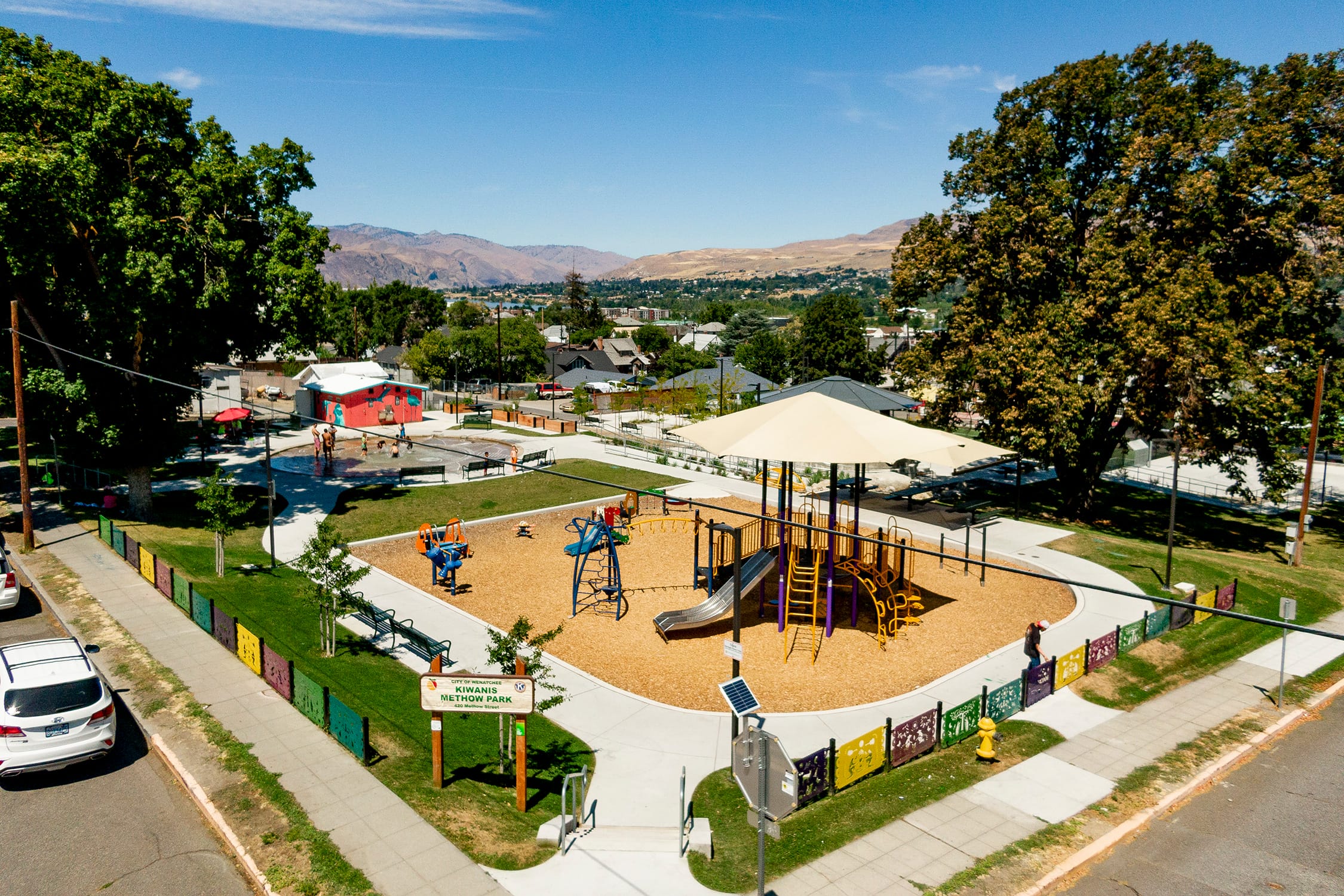
Photo: Stuart Isett
Once the park renovation was finished, Teresa and her neighbors formed a group to ensure it would be maintained, offer culturally relevant programming, and be a space where local artisans and vendors can thrive.
They began calling themselves Parque Padrinos, or godparents of the park. Teresa explains how meaningful the name is. “In Latino culture, padrinos are . . . chosen to help support you at an important time in your life, like when you are baptized, when a young lady turns 15, or when you get married. They are not just there on the day of the celebration; they are people you can count on for the rest of your life.
“So we chose this name because we wanted to make sure that the commitment that we were making to the park wasn’t going to just end after the ribbon cutting. We saw this as an opportunity to continue to care for it for generations to come.”
Today, Kiwanis Methow Park is a source of pride and cohesion in Wenatchee. And the Parque Padrinos—120 members strong—continue to organize and engage neighbors in other efforts, including get-out-the-vote campaigns. Once residents saw the outcomes of coming together to build a new park and speaking up for what they needed, they were more easily convinced to vote in elections and support politicians who represented their interests. In 2018, thanks in part to the Parque Padrinos, Latino voter turnout in Wenatchee went up threefold.
Teresa accepts the hero title proudly. “A hero is a person who makes a positive difference in their community, neighborhood, or even just within their family,” she says. “A hero is someone who sees a need and fulfills it, not necessarily for [public] recognition, but just to do whatever they can to help. I think that we probably encounter heroes every day; we just aren’t aware of the positive impact they have made throughout their lifetime, or even just in the last week.”
But people in Wenatchee are aware of Teresa’s impact, especially the young people. Teresa lights up talking about two young girls she inspired. Grace and Zoe, ages 5 and 7, are sisters and members of a folkloric dance troupe that practices at the park. The girls and their mother are some of the most dedicated park volunteers, says Teresa. They go to all of the meetings, all of the events. The girls look for any way they can participate, by handing out brochures, passing out pens at community meetings, greeting people as they come in, anything at all.
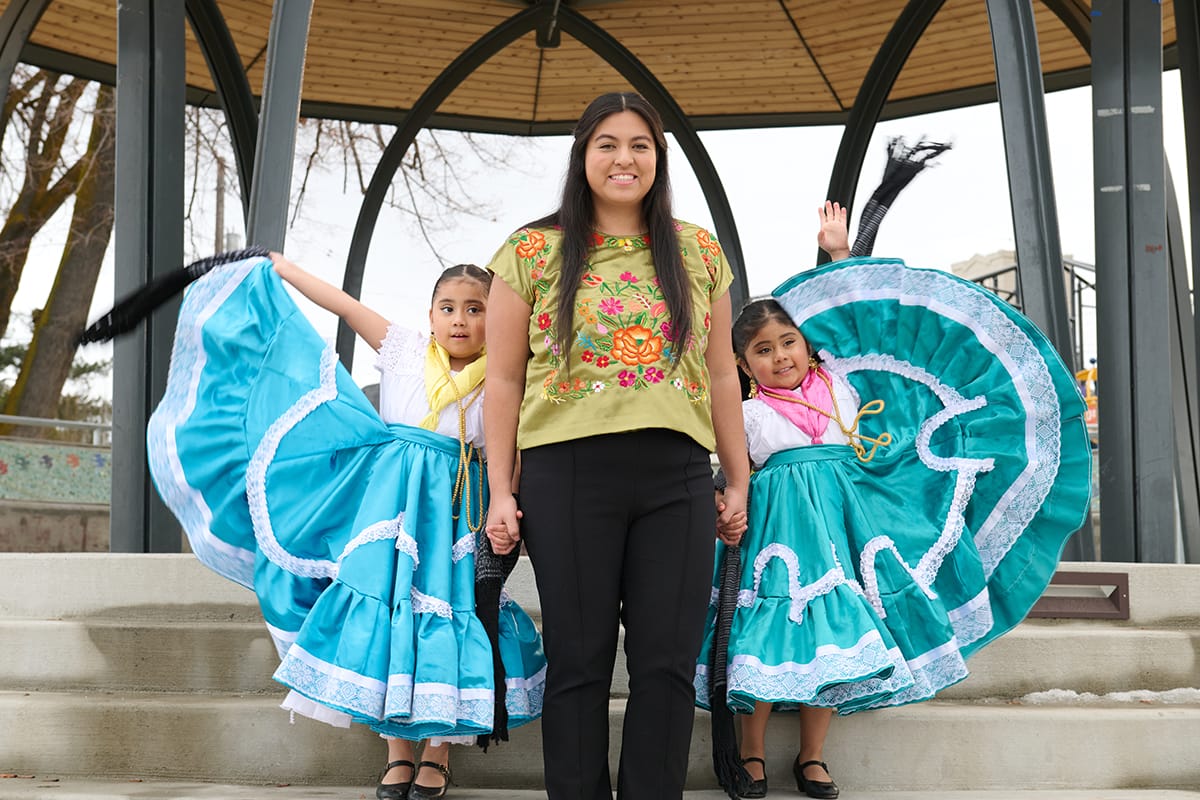
“I know that, in a couple of years, I may not necessarily be at the front of this organization. But I know we are creating spaces and opportunities for young people like Grace and Zoe.”
“There are people who have thanked me for my work, but these two young girls actually told me that they want to be like me when they grow up. And that fills my heart with joy because I know that, in a couple of years, I may not necessarily be at the front of this organization. But I know we are creating spaces and opportunities for young people like Grace and Zoe. They will have people who look like them, who have similar backgrounds as them, and who have been able to make changes in our community, and they will know they are more than capable of doing it themselves too.”
Want to help heroes like Teresa and Parque Padrinos make change in communities across the country? Join Trust for Public Land and support our work to make every hometown greener, safer, and more livable.

